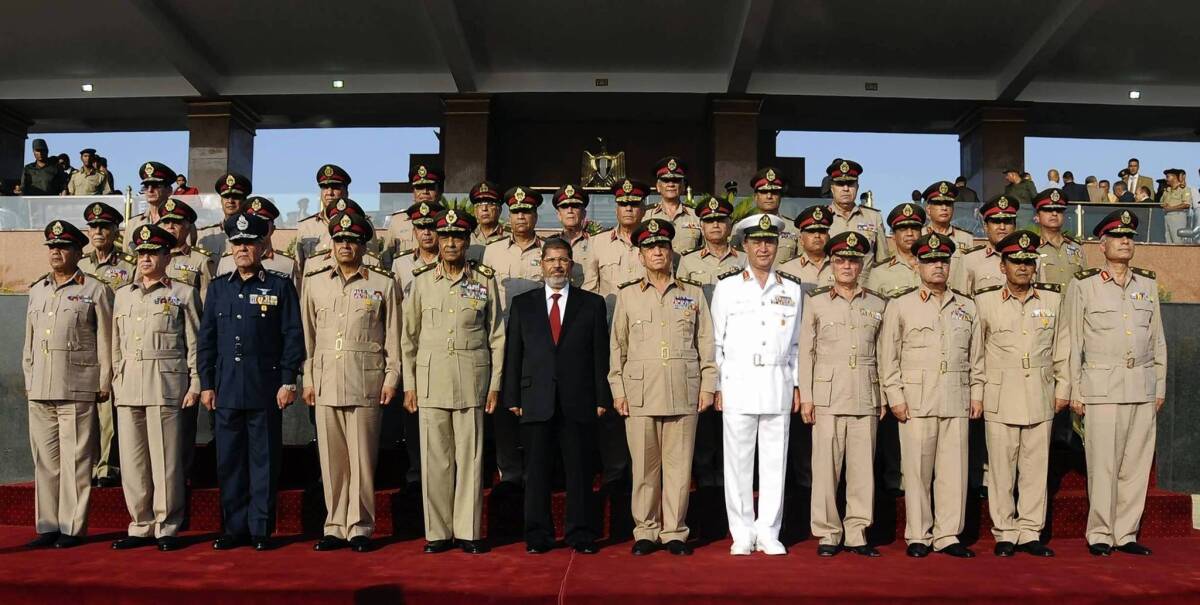Mohamed Morsi sworn in as Egypt’s first Islamist president

- Share via
CAIRO — Mohamed Morsi, the son of a peasant farmer who rose through the ranks of the once-banned Muslim Brotherhood, was sworn in Saturday as Egypt’s first freely elected president in a historic and potentially dangerous transition from military rule to a democratic government.
The spirit of an unpredictable new era marked the day as Morsi sought to project a populist’s air while brushing up against the pillars of the old guard. Dressed in a dark suit and wearing a trimmed beard, he symbolized the region’s rising political Islam even as the authority of his office has been diminished by the generals in charge of the transitional government.
That was evident in his inauguration before the Supreme Constitutional Court, which is loyal to the army and recently dissolved the Islamist-dominated parliament; swearing-in ceremonies usually occur in the parliament. Morsi will name a Cabinet in coming days, but executive powers over the armed forces, intelligence services and the national budget will be held by the army until a new constitution is drafted.
“We aspire to a better tomorrow, a new Egypt and a second republic,” Morsi, 60, said during the ceremony, broadcast live on state television. “Today, the Egyptian people laid the foundation of a new life: absolute freedom, a genuine democracy and stability.”
Egypt’s path toward democracy has been messy, and often bloody, but the specter of Morsi standing on a podium in front of the national flag became an instant icon for an Arab world in search of a new identity after 16 months of upheaval.
The hectic Egyptian capital was inlaid with images that only months ago would have been inconceivable: The nation’s first Islamist president was saluted by the head of the ruling military council who for decades supported Hosni Mubarak’s persecution and arrests of thousands of Brotherhood members, including Morsi. Across the street from the court’s Pharaonic architecture, Mubarak, sentenced to life in prison for complicity in the deaths of hundreds protesters during last year’s upheaval that ousted him from power, lay in a military hospital suffering from heart ailments.
The new leader pressured the military in his inaugural address later at Cairo University, promising Egyptians that the revolution would not rest until Morsi was granted full presidential powers. Such pronouncements from a conservative Islamist who grew up in the fields of the Nile Delta thrilled much of the country and defined the fierce political struggle between Morsi and the generals.
But the uncharismatic U.S.-educated engineer showed a degree of political pragmatism he is likely to need in the sensitive task of rolling back the military’s authority. With Field Marshal Mohamed Hussein Tantawi, head of the military council, sitting before him in the university auditorium, Morsi repeatedly praised the army and credited the generals for allowing him to assume power.
“The Supreme Council of the Armed Forces has kept its word and fulfilled its promise,” he said. “The elected institutions will come back to take their role, and the Egyptian armed forces, Egypt’s great army, will return to protecting the borders of the country.” He said the military would remain “strong and solid” and he would keep “good relations between this institution and the people.”
That tone irritated activists and revolutionaries who have blamed the army for crackdowns and human rights abuses over the last 16 months. But it showed in stark terms Morsi’s transformation from an opposition figure to a head of state attempting to appeal to revolutionary voices while appeasing the traditional powers suspicious of Islam’s influence on public policy.
“That’s the price he had to pay to win,” said Ahmed Aggour, an activist. “He officially told the army: ‘I will be your puppet, I’ll protect your interests, and ensure your safety.’ That’s why Tantawi was clapping.”
Morsi, who won nearly 52% of the vote in last month’s runoff, leads a polarized Egypt. The fractious nature of the country’s politics could be glimpsed in the crowd at the university speech, which included ultraconservative Islamist Salafis, Christian Copts, remnants of Mubarak’s regime and reformists, such as Nobel Peace Prize laureate Mohamed ElBaradei. All will be maneuvering to influence the writing of the constitution.
In a poignant moment in his address, Morsi saw bobbing in the crowd posters of demonstrators killed during the revolution. He told their families: “It’s because of the sacrifice your children made that we have all of this.”
But the young and educated outside the university’s gates wondered how Morsi would fix deepening social and economic problems, including plummeting tourism, billions of dollars in lost foreign investments and a vast and corrupt state bureaucracy.
“I graduated from this university in 2005 and I am still unemployed,” said Sayed Ali, pointing to one of the oldest colleges in the Arab world. “I have law degree, but I’ve wiped tables and cleaned hotels. I want him to tell us how he will provide us with jobs.”
But in coming months much of Morsi’s focus will be wresting power from the generals, shaping a constitution that will be rooted in Islamic law, known as sharia, and working to restore the parliament. Activists and liberals are concerned that his agenda is too Islamic-based. Morsi has promised, though, to name a Cabinet and vice presidents that include at least one woman, a Christian and representatives of other political parties.
“We start a new phase in the history of Egypt,” he said. “We will forget the ugly page of the past. We will start a bright new page.”
Special correspondent Reem Abdellatif contributed to this story.
More to Read
Sign up for Essential California
The most important California stories and recommendations in your inbox every morning.
You may occasionally receive promotional content from the Los Angeles Times.











